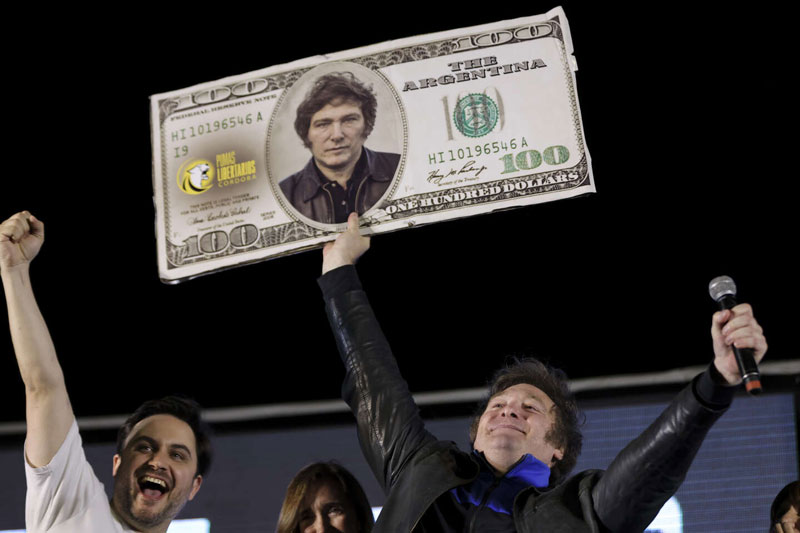Would Argentina’s TV sector replace successful Turkish dramas with Chinese soap operas? Would Turkish companies accept the Chinese Yuan instead of the U.S. dollar for their novelas? Both scenarios could soon play out now that Javier Milei, a 53-year-old economist, has been elected president of Argentina. Milei wants to adopt the U.S. dollar as the national currency, scrap the Central Bank of Argentina, and give priority to the U.S. over China. But China is a major buyer of Argentina’s soybeans, its lithium, and other exports. Plus, Argentina borrowed Yuan from China to service repayments to various creditors. The government owes $67 billion to overseas bondholders, $40 billion to the International Monetary Fund, and $41 billion in unpaid import bills. Since 2000, it has defaulted on its sovereign debt on three occasions.
Even though Milei is portrayed as erratic, switching to a U.S. currency is not a far-fetched proposition. Outside the U.S., 16 countries use the U.S. dollar as their national currency, including LatAm’s Ecuador, El Salvador, and Panama.
Descriptions of the new president run the gamut. Some say that he’s a free-market economist and libertarian who is studying to convert to Judaism and has a rabbi as one of his advisors. Others point to the fact that he used to front a rock band, that he became popular due to his TikTok and YouTube posts, and that he is a self-described anarcho-capitalist.
Milei grew up in Buenos Aires, and after a brief period serving as a goalie for the professional soccer team Chacarita Juniors, he shifted to economics, obtaining two master’s degrees and working for several financial companies.
He later became a university professor teaching economics courses, and in 2021 was elected to the Argentine Chamber of Deputies with “Libertad Avanzata,” a political coalition.
This is how The Wall Street Journal described Milei: “An eccentric economics professor-turned-TV pundit, recognizable for his sideburns and wild bouffant hair.”
This is not the first time that Argentina has looked at the dollar as the salvation for its 46 million people — 40 percent of whom live below the poverty line. In 1983, the dollar-peso exchange was 1:1, and either currency could be used. Today, the exchange is $1 for 1,000 pesos on the black market, meaning that the peso has basically lost 90 percent of its value against the dollar over the last four years, while inflation has now reached 142.7 percent.
To dollarize its economy, Argentina would need to borrow some $30 billion and sell state-owned companies. However, Argentines have an estimated $250.4 billion stashed overseas, according to the INDEC national statistic bureau, which also reported that Argentine direct investments abroad have risen to a total $40.709 billion. These cover all kinds of items, including properties and cars. In the last quarter of 2023 these assets increased by 0.07 percent ($295 million), while “portfolio investments” for any kind of financial assets totaled $69.73 billion. On the other hand, Argentina’s peso holders represent $9 billion. Under Milei’s dollarization plan, Argentines would eventually have to swap all of their pesos for dollars.
In terms of size, Argentina has LatAm’s second-largest economy, and while agriculture is very efficient with exports of soybeans, corn, and wheat (as agribusiness and ranching dominate the economy), manufacturing is very inefficient.
The television sector has also lost its international prominence, with U.S. companies now running the show since all the major U.S. studios have strong bases in Argentina. As for TV broadcasters, only Telefe is in the hands of a U.S. company (Paramount). Canal 9 (El Nueve) was also in the hands of a U.S. company (Albavisión, owned by Ángel González), but is now owned by trade unionist Víctor Santa María, owner of Grupo Octubre, a media holding company reportedly financed by Cristina Fernández de Kirchner, a former Peronist (leftist) president of the country, and more recently a vice president who was sentenced to six years in prison for her part in a $1 billion fraud case (but unlikely to serve any prison time as she has immunity due to her government roles).
According to a report from Argentina from a TV executive who wished to remain anonymous, it will take at least a year for dollars to flow into the economy, to create a pseudo double-currency system, for the government to then be able to convert pesos to dollars, to formalize the dollar-peso, and finally to take the peso out of the economy. If Congress approves a law that allows private contracts in dollars this month, this will show a clear plan and push inflation down almost immediately.
However, the same TV executive who sent the above report stated that “Milei talks quite a lot of nonsense, mixed with some sensible stuff.” During the second presidential runoff ballot, Milei took 56 percent of the vote to 44 percent for Peronist Economic Minister Sergio Massa.
The challenges that Milei faces are formidable. He will have to get the dollarization through the bicameral legislature, which is dominated by the center-right and center-left, and still need to win over some of the Peronists in the Senate (a difficult prospect).
In a lengthy article in its November 21, 2023 edition, The New Yorker reported that past attempts at Argentinian dollarization failed due to a number of reasons, including that Domingo Cavallo, the neoliberal former minister of the economy who served from 1991 to 1996 under Peronist President Carlos Menem, responded to hyperinflation by making the peso fully convertible with the U.S. dollar.
Within a few years, the inflation rate declined from more than 1,000 percent to less than 20 percent. But dollarization turned out to be problematic because in the late ’90s, a surge in the value of the dollar (and the peso) made Argentina’s exports uncompetitive internationally. The economy plunged into a deep recession, and capital started to flee the country.
After Cavallo returned to office in 2001, capital flight accelerated, and he eventually ordered banks to limit cash withdrawals. In December 2001, riots broke out in cities across Argentina. Cavallo resigned. So did Fernando de la Rúa, the then-president from the “Union Civica Radical” political party (after serving only two years of a four-year term). Shortly after that, Argentina defaulted on its debts and eventually abandoned the currency peg. Milei’s only criticism of Cavallo’s convertibility policy is that it kept the peso in circulation, and it could therefore be restored as the country’s main currency, which happened in 2002, when parity with the U.S. dollar was dropped.
Now, while during his televised inaugural speech Milei told Argentines an “uncomfortable truth, rather than a comfortable lie” when referencing the need to cut GDP spending by 15 percent, observers are also monitoring his plans to give away his (equivalent of) $3,200 monthly presidential salary, as he is already wealthy enough to have cloned five dogs at a total cost of $50,000 (he reportedly refers to them as “my four-legged children.”), his companions at Casa Rosada, the country’s presidential offices. Since he isn’t married, his sister will take on the role of First Lady of Argentina.
(Editor’s note: All $ figures are in U.S. dollars)
(By Dom Serafini)
Audio Version (a DV Works service)











Leave A Comment